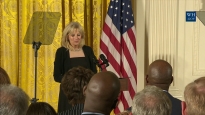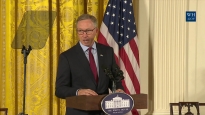Weekly Address: The President’s Plan to Create Jobs and Cut the Deficit
April 06, 2013 | 4:58 | Public Domain
President Obama tell the American people about the budget he is sending to Congress, which makes the tough choices required to grow our economy and shrink our deficits.
WEEKLY ADDRESS: The President’s Plan to Create Jobs and Cut the Deficit
WASHINGTON, DC—President Obama used his weekly address to tell the American people about the Budget he is sending to Congress this week, which makes the tough choices required to grow our economy and shrink our deficits. The President’s Budget calls for a balanced approach to deficit reduction, including reforms that strengthen Medicare for future generations and tax reform that closes wasteful loopholes, so we can afford the investments required to grow grow the economy, create new jobs, and reignite the engine of our economic growth: a rising, thriving middle class.
The audio of the address and video of the address will be available online at www.whitehouse.gov at 6:00 a.m. ET, Saturday, April 6, 2013.
Remarks of President Barack Obama
Weekly Address
The White House
April 6, 2013
Hi, everybody. Our top priority as a nation, and my top priority as President, must be doing everything we can to reignite the engine of America’s growth: a rising, thriving middle class. That’s our North Star. That must drive every decision we make.
Now, yesterday, we learned that our businesses created 95,000 new jobs last month. That’s about 500,000 new jobs this year, and nearly 6.5 million new jobs over the past three years.
But we’ve got more work to do to get the economy growing faster, so that everybody who wants a job can find one. And that means we need fewer self-inflicted wounds from Washington, like the across-the-board spending cuts that are already hurting many communities – cuts that economists predict will cost our economy hundreds of thousands of jobs this year.
If we want to keep rebuilding this economy on a stronger, sturdier foundation for growth – growth that creates good, middle-class jobs – we need to make smarter choices.
This week, I’ll send a budget to Congress that will help do just that – a fiscally-responsible blueprint for middle-class jobs and growth.
For years, an argument in Washington has raged between reducing our deficits at all costs, and making the investments we need to grow the economy. My budget puts that argument to rest. Because we don’t have to choose between these goals – we can do both. After all, as we saw in the 1990s, nothing reduces deficits faster than a growing economy.
My budget will reduce our deficits not with aimless, reckless spending cuts that hurt students and seniors and middle-class families – but through the balanced approach that the American people prefer, and the investments that a growing economy demands.
Now, the truth is, our deficits are already shrinking. That’s a fact. I’ve already signed more than $2.5 trillion in deficit reduction into law, and my budget will reduce our deficits by nearly $2 trillion more, without harming the recovery. That surpasses the goal of $4 trillion in deficit reduction that many economists believe will stabilize our finances.
We’ll make the tough reforms required to strengthen Medicare for the future, without undermining the rock-solid guarantee at its core. And we’ll enact commonsense tax reform that includes closing wasteful tax loopholes for the wealthy and well-connected – loopholes like the ones that can allow a billionaire to pay a lower tax rate than his or her secretary.
This is the compromise I offered the Speaker of the House at the end of last year. While it’s not my ideal plan to further reduce the deficit, it’s a compromise I’m willing to accept in order to move beyond a cycle of short-term, crisis-driven decision-making, and focus on growing our economy and our middle class for the long run. It includes ideas many Republicans have said they could accept as well. It’s a way we can make progress together.
But deficit reduction cannot come at the cost of economic growth or middle-class security. And it doesn’t have to. My budget will make critical investments to grow the economy, create jobs, and strengthen the middle class.
As I said in my State of the Union Address, every day, we should ask ourselves three questions: how do we make America a magnet for good jobs? How do we give our workers the skills they need to do those jobs? And how do we make sure that hard work leads to a decent living?
To make America a magnet for good jobs, we’ll invest in high-tech manufacturing and homegrown American energy, put people to work building new roads, bridges, and schools, and cut red tape to help businesses grow.
To give workers the skills they need to do those jobs, we’ll invest in education that begins in the earliest years, and job training that better equips workers to compete in a 21st century economy.
To make sure hard work is rewarded, we’ll build new ladders of opportunity into the middle class, and focus on revitalizing some of our communities hardest-hit by recession and job loss.
All of these investments will help grow the economy and create jobs. None of them will add to the deficit. And I will lay out these priorities in greater detail in the days ahead.
It’s a budget that doesn’t spend beyond our means. And it’s a budget that doesn’t make harsh and unnecessary cuts that only serve to slow our economy. We’ll keep our promise to an aging generation by shoring up Medicare. And we’ll keep our promise to the next generation by investing in the fundamentals that have always made America strong – manufacturing and innovation, energy and education.
Because that’s what it’ll take to make sure America remains strong in the years ahead – and to leave behind something better for our kids.
Thank you.
###
|
November 15, 2016
|
November 15, 2016
|
November 14, 2016
|
November 14, 2016
|
|
November 14, 2016
|
November 14, 2016
|
November 14, 2016
|
November 14, 2016
|
- &lsaquo previous
- …
- 8
- 9
- 10
- 11
- 12
- 13
- 14
- 15
- 16
- …
- next &rsaquo







